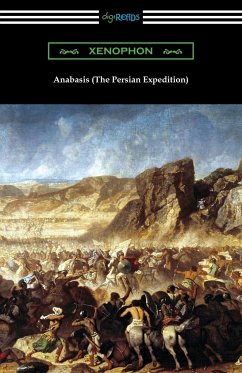
Anabasis (The Persian Expedition)
Versandkostenfrei!
Versandfertig in 1-2 Wochen
14,99 €
inkl. MwSt.

PAYBACK Punkte
7 °P sammeln!
Widely considered the most famous work of the professional soldier and writer Xenophon, "Anabasis" is a true tale of dangerous adventure in ancient Greece. Though advised not to join the army of 10,000 by his friend Socrates, Xenophon does set out with Cyrus the Great in that man’s attempt to gain the empire of Persia from his brother. When this leader is killed in battle, however, the army loses cause and direction, and the result is a ‘marching republic’ in which the remainder of the army must fight their way home. Through endless miles of hostile territory where their foes crop up at ...
Widely considered the most famous work of the professional soldier and writer Xenophon, "Anabasis" is a true tale of dangerous adventure in ancient Greece. Though advised not to join the army of 10,000 by his friend Socrates, Xenophon does set out with Cyrus the Great in that man’s attempt to gain the empire of Persia from his brother. When this leader is killed in battle, however, the army loses cause and direction, and the result is a ‘marching republic’ in which the remainder of the army must fight their way home. Through endless miles of hostile territory where their foes crop up at every turn, Xenophon emerges as one of the few men capable of making decisions and leading the army through a variety of difficulties in a perilous retreat back to Greece. When at last they reach the sea and know they are near their homeland, their cries of fierce joy resound and become the stuff of legend. Told in forthright and unpretentious prose, this epic journey of extraordinary endurance over hardship remains an entertaining account that exemplifies Socratic philosophy, classic Greek writing, and the bygone valor of remarkable warriors. This edition follows the translation of H. G. Dakyns and is printed on premium acid-free paper.














